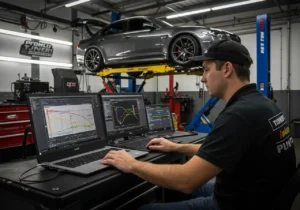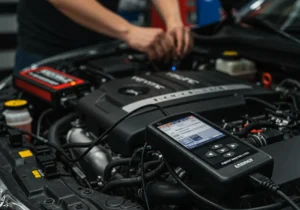Custom tuning is a process of reprogramming or adjusting a vehicle’s Engine Control Unit (ECU) to optimize its performance beyond the factory settings. Modern cars come with factory ECU calibrations that balance performance, drivability, emissions, and safety, but these settings often limit the engine’s true potential.
Purpose of custom tuning:
- Performance Optimization: Custom tuning modifies parameters like fuel injection timing, ignition timing, and throttle mapping to extract maximum performance from your engine.
- Enhanced Driving Experience: By fine-tuning these parameters, you can achieve improved horsepower, torque, throttle response, and fuel efficiency.
Benefits of unlocking a car’s true potential:
- Increased Power: Custom tuning can significantly boost your car’s horsepower and torque.
- Better Throttle Response: Enhanced throttle mapping ensures quicker and smoother acceleration.
- Improved Fuel Efficiency: Optimized engine parameters can lead to better fuel economy.
Understanding custom tuning helps you make informed decisions on how to maximize your vehicle’s performance while maintaining reliability.
Understanding Custom Tuning
What is Custom Tuning?
Custom tuning involves reprogramming the Engine Control Unit (ECU) to optimize a vehicle’s performance beyond its factory settings. This process begins with reading the original ECU map and creating a backup. Specialized tuning devices or software are then used to modify various engine parameters, such as:
- Fuel injection timing
- Ignition timing
- Throttle mapping
- Air/fuel ratios
These adjustments are tailored to enhance:
- Horsepower
- Torque
- Throttle response
- Drivability
- Fuel efficiency
The Role of ECU in Performance Optimization
The ECU is essentially the brain of your vehicle’s engine management system. It controls critical functions like:
- Fuel delivery
- Ignition timing
- Emission controls
By making precise modifications to the ECU settings, you can unlock significant performance gains. For instance, adjusting the ignition timing can lead to better combustion efficiency, while optimizing fuel injection timing can improve power output and fuel economy.
To delve deeper into how custom tuning works and the specific aspects of ECU optimization, one can explore various resources available online.
How Factory Settings Impact Engine Potential
Factory ECU calibrations are designed to balance performance, emissions, safety, and drivability for a wide range of driving conditions and regulatory requirements. While these settings ensure reliability and compliance with environmental standards, they often limit the engine’s true potential.
Custom tuning addresses these limitations by allowing more aggressive calibrations that maximize performance without compromising reliability or compliance.
Custom tuning provides enthusiasts with a way to safely extract additional power from their engines and improve overall vehicle performance.
 Key Parameters Modified in Custom Tuning
Key Parameters Modified in Custom Tuning
Custom tuning involves adjusting specific engine settings that determine how your car behaves in various situations. The most significant changes typically include fuel injection timing, ignition timing, and throttle mapping.
1. Fuel Injection Timing
Fuel injection timing refers to the precise moment when fuel is injected into the combustion chamber. This timing plays a crucial role in both power output and fuel efficiency. By advancing or delaying the injection event, tuners can achieve more complete combustion, resulting in increased horsepower and optimized fuel consumption.
Performance tuners make adjustments to this parameter based on several factors, including:
- Modifications made to the engine
- Quality of fuel being used
- Driving style and preferences
2. Ignition Timing
Ignition timing is the point at which the spark plug ignites the air-fuel mixture inside the engine cylinder. This timing directly affects power delivery and smoothness of operation. Advancing ignition timing can lead to higher power output, but it requires the use of high-quality fuel that is resistant to knocking.
Tuners carefully calibrate ignition maps to strike a balance between maximizing power potential and ensuring reliability.
3. Throttle Mapping
Throttle mapping defines how the position of your accelerator pedal translates into engine response. In factory settings, there may be intentional delays or dampening effects implemented for reasons such as comfort or emissions control.
By customizing these throttle maps, tuners have the ability to create a more direct and immediate connection between your foot and the engine’s power delivery. This can result in a more engaging driving experience, whether during everyday commutes or high-performance track sessions.
Each of these parameters works in harmony with another to customize your car’s behavior according to your specific objectives—be it improving lap times on a racetrack, hauling heavy loads for work purposes, or simply enhancing enjoyment during daily drives.
 Tools and Devices for Custom Tuning
Tools and Devices for Custom Tuning
Tuning devices play a critical role in the custom tuning process, providing the necessary interface to modify your vehicle’s Engine Control Unit (ECU). These specialized devices come in various forms, each offering unique features to enhance your car’s performance.
1. Handheld Programmers
These are portable devices that connect directly to your vehicle’s OBD-II port. Handheld programmers often come with preloaded tunes and allow for custom tune uploads. Examples include the SCT BDX Performance Programmer and DiabloSport’s Trinity tuner.
2. Laptop-Based Software
This type of tuning device involves software installed on a laptop, which is then connected to the vehicle’s OBD-II port via a cable. It offers advanced tuning capabilities and is commonly used by professional tuners.
3. Piggyback Systems
These devices are installed between the ECU and engine sensors. They modify sensor signals before they reach the ECU, tricking it into altering fuel delivery and ignition timing.
These tools connect seamlessly to the vehicle’s OBD-II port, a standardized gateway used for diagnostics and communication with the ECU. By plugging into this port, tuning devices can access vital engine parameters, upload new calibrations, and monitor real-time data effectively.
Understanding these tools allows you to make informed decisions about custom tuning, ensuring you unlock your car’s true potential with precision and efficiency.
Popular Custom Tuning Products on the Market
Here are some popular custom tuning products available today:
1. SCT BDX Performance Programmer
SCT BDX Performance Programmer stands out as a flexible solution for a wide range of vehicles. It provides both preloaded and custom tuning options, accessible via WiFi with cloud support from authorized dealers. Notable features include real-time engine parameter monitoring, datalogging, and the ability to read and clear diagnostic trouble codes. Emissions compliance is built in, which appeals to drivers who require legal assurance alongside performance gains.
2. Paragon Performance C8 Corvette Stingray LT2 Bolt On Tune
Paragon Performance C8 Corvette Stingray LT2 Bolt-on tune delivers targeted enhancements for Corvette owners seeking maximum output from the LT2 engine. This tune optimizes fuel delivery based on octane choice, recalibrates throttle mapping for sharper response, and adjusts timing to increase wheel horsepower while reducing engine knock. Owners notice immediate improvements in acceleration and drivability without sacrificing reliability.
3. DiabloSport’s Trinity tuner
DiabloSport’s Trinity tuner offers extensive customization for enthusiasts who want more control. Users can modify parameters such as fuel ratios, ignition timing, torque management, shift points, idle RPM, and rev limiter settings. The intuitive touchscreen interface supports data monitoring and logging during live driving sessions. This tuner caters to those who demand a tailored driving experience that matches their specific vehicle modifications and personal preferences.
Each of these products demonstrates how modern tuning solutions can be adapted to different platforms and goals, allowing users to unlock significant performance improvements through precise ECU adjustments.
The Advantages of Custom Tuning with Aftermarket Parts
Pairing custom tuning with aftermarket parts installation is crucial for maximizing overall gains. Enhanced hardware support, such as performance exhaust systems, cold air intakes, and upgraded turbochargers, can significantly boost your vehicle’s capabilities. Custom tuning adjustments precisely tailor the engine’s parameters to these new components, ensuring optimal performance.
Benefits of Combining Custom Tuning with Aftermarket Parts:
- Improved Power Delivery: Custom tuning fine-tunes the engine’s response to upgraded parts, allowing for a smoother and more powerful acceleration.
- Optimized Air/Fuel Ratios: Adjustments in custom tunes ensure the engine receives the correct mixture of air and fuel, enhancing combustion efficiency.
- Enhanced Throttle Response: Custom tuning modifies throttle mapping to complement aftermarket throttle bodies or intake systems, resulting in a more responsive driving experience.
- Maximized Horsepower and Torque: By adjusting fuel injection timing and ignition timing, custom tunes can extract additional horsepower and torque from high-performance parts.
Custom tuning not only unlocks the potential of factory settings but also amplifies the benefits provided by aftermarket hardware. This synergy between enhanced hardware support and precise tuning adjustments results in a finely-tuned machine that delivers superior performance on all fronts.
Ensuring Reliability and Compliance in Custom Tuning
When enhancing vehicle performance, it’s important to find a balance between aggressive tuning for power gains and long-term reliability. Overly aggressive tunes can cause engine wear or failure, which can shorten your vehicle’s lifespan.
Key considerations for maintaining reliability and compliance include:
- Engine Health Monitoring: Regularly check engine parameters and diagnostic trouble codes (DTCs) to prevent potential issues.
- Emissions Compliance: Ensure that custom tunes adhere to legal emissions standards. Non-compliance can result in fines and failed inspections.
Unlocking your car’s true potential while ensuring reliability and compliance requires a thoughtful approach, prioritizing both performance and durability.

 Key Parameters Modified in Custom Tuning
Key Parameters Modified in Custom Tuning Tools and Devices for Custom Tuning
Tools and Devices for Custom Tuning